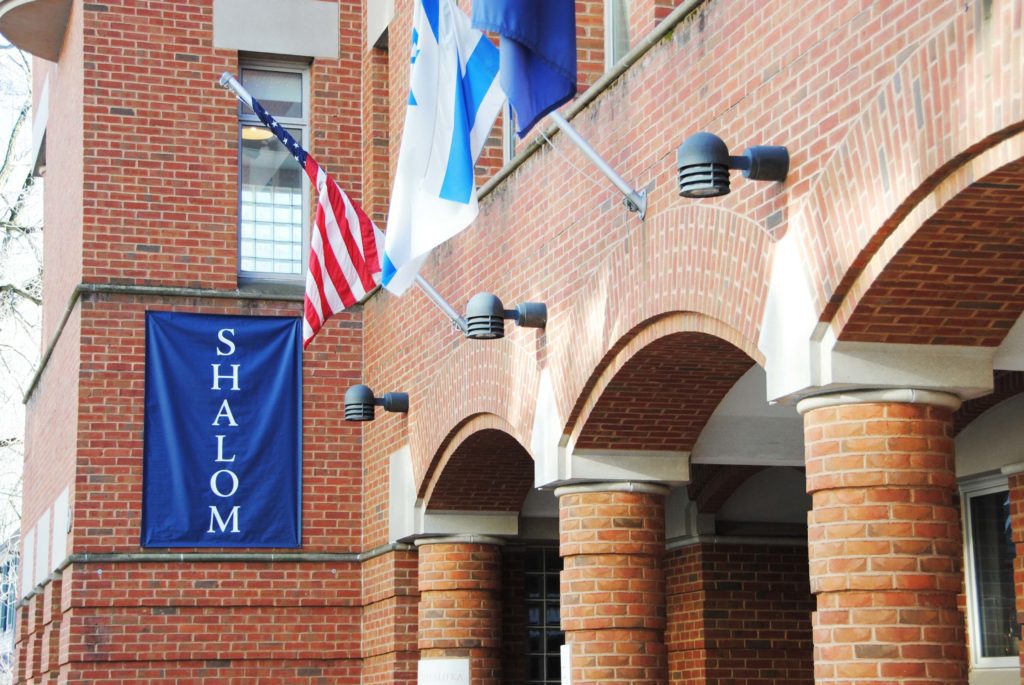
Yale Daily News
The Slifka Center for Jewish Life, nestled just beyond Blue State Coffee on Wall Street, opened its doors this semester for the first time since spring 2020.
After a four-year renovation process, the Slifka Center now welcomes visitors who come for Jewish prayer, kosher food or just to look around. According to Slifka Center Executive Director Uriel Cohen, the Building Forward 25 Year Capital Campaign — which funded the recent renovation — garnered over $8 million in donations and loans. The planning process began in 2018 when the Center’s leadership hired an architect and contractors and gathered student input. However, COVID-19 posed challenges for the project’s progress. Construction didn’t kick off until November 2020.
“We had been planning to start during the 20-21 academic year before the pandemic, but the onset of COVID first put a bump in the road and then paved the way for the project to proceed,” Cohen wrote in an email to the News. “We were not, however, counting on the COVID-related work stoppages, myriad supply-chain issues, and other unforeseen circumstances that caused delays that resulted in the project lasting much longer. We are [now] so excited that the building has reopened and is fully functional.”
With a completely renovated interior, the Center allows large groups of students to gather safely for religious and cultural events and academic programming. Beyond being a prayer and dining space, the Center offerings include a specific LGBTQ+ Jewish affinity space, mental health resources through the Noah Wellness Center and weekly classes — including Torah study and an Introduction to Judaism course.
The campaign also allowed for the Center to entirely renovate its kitchen and dining hall, the former of which had not been updated since the building opened in 1995. The project was then prolonged as contractors discovered more structural problems within the building.
“During demolition we found a number of unanticipated problems in the lower level infrastructure that would have caused major problems if they were left unaddressed,” Cohen wrote. “The project expanded at that point to include fixing these problems, and we feel fortunate to have been able to address those issues for good.”
The Slifka Center kitchen remains Yale’s only kosher dining facility. The renovations involved a 20 percent boost in seating capacity in the new, modernized dining hall, as well as the implementation of new security infrastructure.
“With antisemitism and hate on the rise locally and nationally, we followed the best practices and advice from our security consultants and partners to make sure we keep our community safe,” Cohen said.
According to a survey from the Anti-Defamation League, 2021 saw a 34 percent increase in antisemitic hate crimes in 2021. Cohen also pointed to specific instances on Yale’s campus — including antisemitic graffiti in the past years — as evidence for the necessity of increased security.
“Slifka Center is committed to a vibrant Jewish community at Yale, and committed against antisemitism in all its forms,” Cohen said. “The building can help protect us from external physical threats. What we do inside the building, both within and beyond the Jewish community, can help grow understanding, empathy and human connections that overcome all forms of hate.”
Besides physical safety, Cohen also noted the need for public health safety. He said that the newly-opened center’s “most pressing task” is helping the community heal from the COVID-19 pandemic.
Rabbi Jason Rubenstein, Yale’s Jewish chaplain, noted that having a physical space is especially important given the various Jewish denominations that have a presence on campus.
“Without Slifka Center’s architecture and scale — where people are together, to study, to come together for Shabbat and holidays, to relax, to sing, to volunteer, and just to hang out or have a good cry or laugh — we couldn’t bring the different sub-communities together to form our larger, diverse community,” Rubenstein wrote to the News. “Returning from our temporary, scattered quarters to a very attractive, very functional space allows us to begin the real work of meeting and encountering one another.”
Hillel Student Board President Maayan Schoen ’23 agreed with the sentiment of pluralism across Jewish denominations, which she called a “hallmark” of Slifka.
Other students were eager to get back into the space and had positive opinions of the renovation. Leo Greenberg ’26 shared that although he has only been on campus a short time, the Slifka Center is “a great community space” that he hopes to explore more.
“I can imagine groups of people getting together there for Shabbat or holiday services,” Greenberg said.
Schoen shared that this past Shabbat, she was able to watch old friends reconnect in the new building, which she called “simply a joy.” She hopes the new Center will allow students of every class year to reconnect and feel comfortable participating in Jewish life on campus.
Cohen’s vision for Slifka’s future was also optimistic.
“My hope is that over the next few years Slifka Center will grow and flourish as measured by the vitality of Jewish life that emanates from here and the number of students – Jewish and non-Jewish who participate in what we offer,” he wrote. “Jewish heritage and tradition have a lot to contribute to the Yale-wide project of trying to make the world a better place, and my hope is that we will succeed in contributing to that process through every channel we have to offer.”
The Slifka Center’s official reopening celebration is Oct. 13 from 6 to 8 p.m.







